Campus/People
-
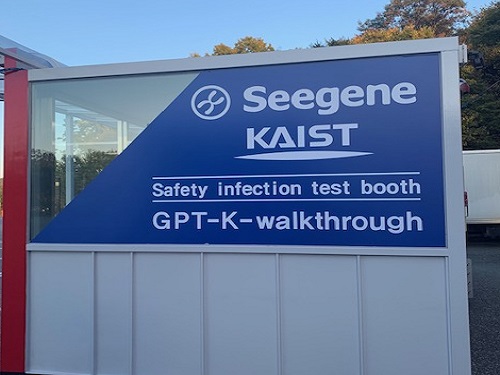 Seegene Opens Covid-19 Testing Mobile Station on Campus
Seegene donates testing reagents for 40,000 people with results available in three hours
Seegene, a molecular diagnostic testing company, donated enough testing reagents for 40,000 COVID-19 tests for the KAIST community and set up a mobile testing station run by the Seegene Medical Foundation on October 28.
The entire COVID-19 diagnosis process, including specimen collection, PCR testing, and results analysis, can be conducted at the mobile testing unit developed by Seegene. The on-site testing station will help the campus get ready to return to normal, especially as the government is transitioning toward its ‘living with Covid-19’ policy, which eases a range of social distancing restrictions. Any KAIST community member can get a Covid-19 test on campus and receive the results within three hours. The station can conduct up to 7,500 tests per day.
This is an extension of the agreement between KAIST and Seegene made in July for research collaboration. The two institutions will work together on various research projects including ultrafast PCR testing, sample collection, and cloud-based data transmission and analysis.
Prior to this donation, according to an administrative order from Daejeon City, KAIST opened a temporary COVID-19 testing center in collaboration with Seegene and conducted COVID-19 tests at the KAIST Clinic over four days starting from September 28. All students living on campus were tested, and all 2,775 tested negative.
Seegene CEO Jong-Yoon Chun said, "KAIST and Seegene signed an agreement for collaborative research on molecular diagnosis in July prior to this donation, and we are happy to maintain a connection with KAIST.” He added, “We hope that this donation will help students return to their ordinary university lives.”
Vice President for Planning and Budget Bowon Kim said, "As KAIST is currently planning to conduct offline lectures in preparation for ‘living with COVID-19’, Seegene’s donation will be particularly helpful.” He added, “The two institutions will continue to cooperate, leading to not only the short-term stabilization of the campus, but also collaborative research for the vitalization of molecular diagnosis technology and the bio industry.”
2021.11.03 View 6429
Seegene Opens Covid-19 Testing Mobile Station on Campus
Seegene donates testing reagents for 40,000 people with results available in three hours
Seegene, a molecular diagnostic testing company, donated enough testing reagents for 40,000 COVID-19 tests for the KAIST community and set up a mobile testing station run by the Seegene Medical Foundation on October 28.
The entire COVID-19 diagnosis process, including specimen collection, PCR testing, and results analysis, can be conducted at the mobile testing unit developed by Seegene. The on-site testing station will help the campus get ready to return to normal, especially as the government is transitioning toward its ‘living with Covid-19’ policy, which eases a range of social distancing restrictions. Any KAIST community member can get a Covid-19 test on campus and receive the results within three hours. The station can conduct up to 7,500 tests per day.
This is an extension of the agreement between KAIST and Seegene made in July for research collaboration. The two institutions will work together on various research projects including ultrafast PCR testing, sample collection, and cloud-based data transmission and analysis.
Prior to this donation, according to an administrative order from Daejeon City, KAIST opened a temporary COVID-19 testing center in collaboration with Seegene and conducted COVID-19 tests at the KAIST Clinic over four days starting from September 28. All students living on campus were tested, and all 2,775 tested negative.
Seegene CEO Jong-Yoon Chun said, "KAIST and Seegene signed an agreement for collaborative research on molecular diagnosis in July prior to this donation, and we are happy to maintain a connection with KAIST.” He added, “We hope that this donation will help students return to their ordinary university lives.”
Vice President for Planning and Budget Bowon Kim said, "As KAIST is currently planning to conduct offline lectures in preparation for ‘living with COVID-19’, Seegene’s donation will be particularly helpful.” He added, “The two institutions will continue to cooperate, leading to not only the short-term stabilization of the campus, but also collaborative research for the vitalization of molecular diagnosis technology and the bio industry.”
2021.11.03 View 6429 -
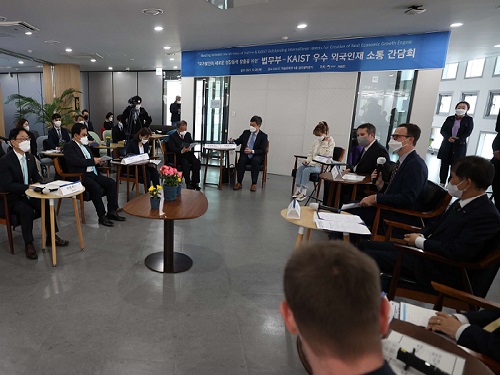 Minister of Justice Meets with KAIST International Community Members
The Office of Immigration Service in Daejeon will dispatch On-Site Immigration Service Team at the campus once a week
Minister of Justice Beom Kye Park met with international students and faculty members on October 29 at the KAIST campus and promised the government’s prompt and flexible revision of the process for acquiring legal residency and Korean citizenship for talents in the fields of science and technology.
During the meeting to discuss immigration difficulties with foreign students, researchers, and faculty at KAIST, many KAIST international students expressed their wishes to continue their research in Korea after graduation and asked for legal support to acquire permanent residence status.
International faculty members including PhD and Master’s candidate and postdoc fellows attended the meeting along with KAIST President Kwang Hyung Lee and Assistant Vice President of the International Office Scott Knowles.
Currently, there are 1,100 international members on campus: 421 undergraduates, 236 Master’s student, 266 PhD candidates, 79 researchers, and 67 faculty members.
President Lee said, “It is prerequisite to nurture the outstanding talents who earned their degrees in Korea for raising our national competitiveness. We would like to ask the government to ease the current system to embrace those excellent talents. That will definitely be necessary for securing new talents as well as for invigorating the domestic industry and R&D sector, which will lead to attracting the next excellent groups of talented students from abroad.”
Minister Park said that the government now needs more inclusive immigration policies granting legal residency and citizenship to the highly talented group. He added that the ministry will make every effort to help our degree holders acquire the relevant legal status to settle down here.
Meanwhile, the Office of Immigration Services in Daejeon set up the ‘On-Site Immigration Service’ at the campus and provided one-on-one consultation services for KAIST international community regarding extension of stays and alien registration affairs.
The On-Site Immigration Service will continue at the campus once a week for convenience of KAIST international community in the very near future.
2021.10.29 View 5318
Minister of Justice Meets with KAIST International Community Members
The Office of Immigration Service in Daejeon will dispatch On-Site Immigration Service Team at the campus once a week
Minister of Justice Beom Kye Park met with international students and faculty members on October 29 at the KAIST campus and promised the government’s prompt and flexible revision of the process for acquiring legal residency and Korean citizenship for talents in the fields of science and technology.
During the meeting to discuss immigration difficulties with foreign students, researchers, and faculty at KAIST, many KAIST international students expressed their wishes to continue their research in Korea after graduation and asked for legal support to acquire permanent residence status.
International faculty members including PhD and Master’s candidate and postdoc fellows attended the meeting along with KAIST President Kwang Hyung Lee and Assistant Vice President of the International Office Scott Knowles.
Currently, there are 1,100 international members on campus: 421 undergraduates, 236 Master’s student, 266 PhD candidates, 79 researchers, and 67 faculty members.
President Lee said, “It is prerequisite to nurture the outstanding talents who earned their degrees in Korea for raising our national competitiveness. We would like to ask the government to ease the current system to embrace those excellent talents. That will definitely be necessary for securing new talents as well as for invigorating the domestic industry and R&D sector, which will lead to attracting the next excellent groups of talented students from abroad.”
Minister Park said that the government now needs more inclusive immigration policies granting legal residency and citizenship to the highly talented group. He added that the ministry will make every effort to help our degree holders acquire the relevant legal status to settle down here.
Meanwhile, the Office of Immigration Services in Daejeon set up the ‘On-Site Immigration Service’ at the campus and provided one-on-one consultation services for KAIST international community regarding extension of stays and alien registration affairs.
The On-Site Immigration Service will continue at the campus once a week for convenience of KAIST international community in the very near future.
2021.10.29 View 5318 -
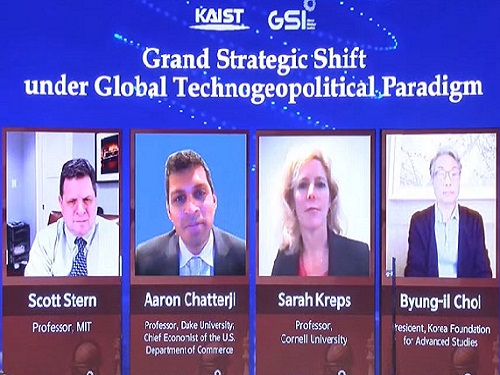 GSI Forum Highlights Global Collaboration Toward a Sustainable Global Economy
The forum stresses global collaboration to make the global value chain more resilient
Speakers at the 5th Global Strategy Institute International Forum on October 28 stressed the importance of global collaboration for rebuilding the global economy and making innovations in national science and technology governance in order to enhance national competitiveness. The forum entitled “Grand Strategic Shift under Global Techno-Geopolitical Paradigm” examined strategies for making the global supply chain more resilient and rebuild the global economy as well as how Korea could advance in the technology race.
Speakers concurred that technology has become an issue of national security. The global supply chain has been disrupted amid the global pandemic and intense conflict between the U.S. and China. Speakers presented a common solution: global collaboration and innovations in science and technology governance.
KAIST President Kwang Hyung Lee said in his opening remarks that the future ‘world map’ may turn out very differently depending on how we prepare and what we envision for the future. He also stressed the importance of technology sovereignty, adding that only those who can create their own new technology independently will be the future leaders.
Prime Minister Boo Kyum Kim and Vice Minister of Science and ICT Hongtaek Yong delivered congratulatory remarks. Keynote speakers included Professor Scott Stern from the MIT Sloan School of Management, Professor Aaron Chatterji from the Fuqua School of Business at Duke University, Professor Sarah Kreps from the Department of Government at Cornell University, SK Group Chairperson Tae-Won Chey, President Woo Il Lee of the Korean Federation of Science and Technology Societies, Professor Young Kwan Yoon at Seoul National University, President Eun Mee Kim of Ewha Womans University, and President Ieehwan Kim of the University of Science and Technology.
During the first session, Professor Chatterji stressed that how to make supply chains resilience will be the key for making long-term strategy with relevant government policy. He said that AI has become a general purpose technology (GPT) and Korea ranked 4th in AI innovation in the world, but how to translate this innovativeness into national strategic leadership will be a new challenge for Korea. He suggested that Korea strengthen its strategic partnerships with allies such as the U.S. and provide opportunities not only for established players but start-ups and entrepreneurs. Meanwhile, Professor Kreps said that industrial policy should also leverage trust and innovations for building technology alliances with a more longer-term approach, without antagonizing certain groups of nations.
Vice President for Planning and Budget Bowon Kim who joined the forum as a discussant pointed out that in this hyper-connected era, nothing can be manufactured in a single company and country without the global supply chain. “In longer-term policy and strategies, we should embrace China as a global economy partner and include all nations around the world.”
Chairman Chey from SK said that the clear role among universities, industry, and the government doesn’t exist any longer. Now, universities are working hard for the commercialization of technology from their labs. Industry is nurturing the talents inept for future industry, and the government is trying to introduce a more private-sector approach. As such, universities, the government, and industry should embrace all-inclusive approaches encompassing global politics and trade to lead on the global stage.
Meanwhile in the second session, all of the speakers stressed innovation in science and technology governance in order to adopt to the new industrial paradigm. They agreed to make prompt innovations and solid collaborative systems among the government ministries to ensure national competitiveness, especially in the field of science and technology.
President Lee from KOFST said Korea should adopt a first mover strategy and the government should adopt a mission-oriented projects and deregulate more. He pointed out that when mandating more autonomy in decision making, scientists and students can make more creative outcomes.
Professor Yoon at SNU stressed the close alliance with the U.S. in the technology race, but suggested that Korea should also seek ways to help minimize the technology gap between advanced and developing countries. Universities should also be allowed more autonomy in running creative curriculum and academic affairs to in order boost the competitiveness of science and technology.
President Kim from Ewha pointed out the role of education as a public good. In some countries, strengthening science and technology can be accomplished with wider educational opportunities in middle and high schools. President Kim also stressed expanding strategic partnerships. She said Korea should expand its alliances and partnerships, not only with the U.S. but with European countries and other niche countries where certain technologies are superior.
President Kim of UST stressed a new science and technology leadership is required to build technology sovereignty and the government should spearhead the deregulations of the government policy.
This GSI forum was co-hosted by two think-tanks at KAIST, the Korea Policy Center for the Fourth Industrial Revolution (KPC4IR) and the Innovation Strategy and Policy Institute (ISPI).
2021.10.28 View 9275
GSI Forum Highlights Global Collaboration Toward a Sustainable Global Economy
The forum stresses global collaboration to make the global value chain more resilient
Speakers at the 5th Global Strategy Institute International Forum on October 28 stressed the importance of global collaboration for rebuilding the global economy and making innovations in national science and technology governance in order to enhance national competitiveness. The forum entitled “Grand Strategic Shift under Global Techno-Geopolitical Paradigm” examined strategies for making the global supply chain more resilient and rebuild the global economy as well as how Korea could advance in the technology race.
Speakers concurred that technology has become an issue of national security. The global supply chain has been disrupted amid the global pandemic and intense conflict between the U.S. and China. Speakers presented a common solution: global collaboration and innovations in science and technology governance.
KAIST President Kwang Hyung Lee said in his opening remarks that the future ‘world map’ may turn out very differently depending on how we prepare and what we envision for the future. He also stressed the importance of technology sovereignty, adding that only those who can create their own new technology independently will be the future leaders.
Prime Minister Boo Kyum Kim and Vice Minister of Science and ICT Hongtaek Yong delivered congratulatory remarks. Keynote speakers included Professor Scott Stern from the MIT Sloan School of Management, Professor Aaron Chatterji from the Fuqua School of Business at Duke University, Professor Sarah Kreps from the Department of Government at Cornell University, SK Group Chairperson Tae-Won Chey, President Woo Il Lee of the Korean Federation of Science and Technology Societies, Professor Young Kwan Yoon at Seoul National University, President Eun Mee Kim of Ewha Womans University, and President Ieehwan Kim of the University of Science and Technology.
During the first session, Professor Chatterji stressed that how to make supply chains resilience will be the key for making long-term strategy with relevant government policy. He said that AI has become a general purpose technology (GPT) and Korea ranked 4th in AI innovation in the world, but how to translate this innovativeness into national strategic leadership will be a new challenge for Korea. He suggested that Korea strengthen its strategic partnerships with allies such as the U.S. and provide opportunities not only for established players but start-ups and entrepreneurs. Meanwhile, Professor Kreps said that industrial policy should also leverage trust and innovations for building technology alliances with a more longer-term approach, without antagonizing certain groups of nations.
Vice President for Planning and Budget Bowon Kim who joined the forum as a discussant pointed out that in this hyper-connected era, nothing can be manufactured in a single company and country without the global supply chain. “In longer-term policy and strategies, we should embrace China as a global economy partner and include all nations around the world.”
Chairman Chey from SK said that the clear role among universities, industry, and the government doesn’t exist any longer. Now, universities are working hard for the commercialization of technology from their labs. Industry is nurturing the talents inept for future industry, and the government is trying to introduce a more private-sector approach. As such, universities, the government, and industry should embrace all-inclusive approaches encompassing global politics and trade to lead on the global stage.
Meanwhile in the second session, all of the speakers stressed innovation in science and technology governance in order to adopt to the new industrial paradigm. They agreed to make prompt innovations and solid collaborative systems among the government ministries to ensure national competitiveness, especially in the field of science and technology.
President Lee from KOFST said Korea should adopt a first mover strategy and the government should adopt a mission-oriented projects and deregulate more. He pointed out that when mandating more autonomy in decision making, scientists and students can make more creative outcomes.
Professor Yoon at SNU stressed the close alliance with the U.S. in the technology race, but suggested that Korea should also seek ways to help minimize the technology gap between advanced and developing countries. Universities should also be allowed more autonomy in running creative curriculum and academic affairs to in order boost the competitiveness of science and technology.
President Kim from Ewha pointed out the role of education as a public good. In some countries, strengthening science and technology can be accomplished with wider educational opportunities in middle and high schools. President Kim also stressed expanding strategic partnerships. She said Korea should expand its alliances and partnerships, not only with the U.S. but with European countries and other niche countries where certain technologies are superior.
President Kim of UST stressed a new science and technology leadership is required to build technology sovereignty and the government should spearhead the deregulations of the government policy.
This GSI forum was co-hosted by two think-tanks at KAIST, the Korea Policy Center for the Fourth Industrial Revolution (KPC4IR) and the Innovation Strategy and Policy Institute (ISPI).
2021.10.28 View 9275 -
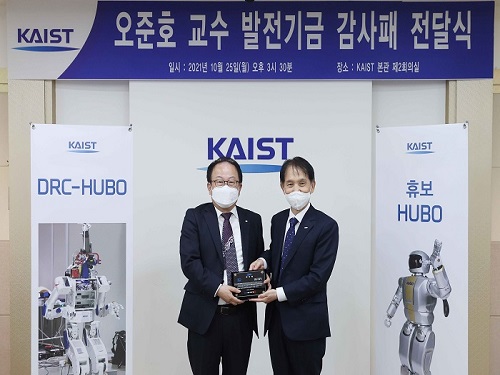 Hubo Professor Jun-Ho Oh Donates Startup Shares Worth 5 Billion KRW
Rainbow Robotics stock used to endow the development fund
Emeritus Professor Jun-Ho Oh, who developed the 2015 DARPA Challenge winning humanoid robot DRC-Hubo, donated 5 billion KRW on October 25 during a ceremony held at the KAIST campus in Daejeon.
Professor Oh donated his 20% share (400 shares) of his startup Rainbow Robotics, which was established in 2011. Rainbow Robotics was listed on the KOSDAQ this February. The 400 shares were converted to 200,000 shares with a value of approximately 5 billion KRW when listed this year.
KAIST sold the stocks and endowed the Jun-Ho Oh Fund, which will be used for the development of the university. He was the 39th faculty member who launched a startup with technology from his lab and became the biggest faculty entrepreneur donor.
“I have received huge support and funding for my research. Fortunately, the research had a good result and led to the startup. Now I am very delighted to pay back the university. I feel that I have played a part in building the school’s startup ecosystem and creating a virtuous circle,” said Professor Oh during the ceremony.
KAIST President Kwang Hyung Lee declared, “Professor Oh has been a very impressive exemplary model for our aspiring faculty and student tech startups. We will spare no effort to support startups at KAIST.”
Professor Oh, who retired from the Department of Mechanical Engineering last year, now serves as the CTO at Rainbow Robotics. The company is developing humanoid bipedal robots and collaborative robots, and advancing robot technology including parts for astronomical observations.
Professor Hae-Won Park and Professor Je Min Hwangbo, who are now responsible for the Hubo Lab, also joined the ceremony along with employees of Rainbow Robotics.
2021.10.26 View 9654
Hubo Professor Jun-Ho Oh Donates Startup Shares Worth 5 Billion KRW
Rainbow Robotics stock used to endow the development fund
Emeritus Professor Jun-Ho Oh, who developed the 2015 DARPA Challenge winning humanoid robot DRC-Hubo, donated 5 billion KRW on October 25 during a ceremony held at the KAIST campus in Daejeon.
Professor Oh donated his 20% share (400 shares) of his startup Rainbow Robotics, which was established in 2011. Rainbow Robotics was listed on the KOSDAQ this February. The 400 shares were converted to 200,000 shares with a value of approximately 5 billion KRW when listed this year.
KAIST sold the stocks and endowed the Jun-Ho Oh Fund, which will be used for the development of the university. He was the 39th faculty member who launched a startup with technology from his lab and became the biggest faculty entrepreneur donor.
“I have received huge support and funding for my research. Fortunately, the research had a good result and led to the startup. Now I am very delighted to pay back the university. I feel that I have played a part in building the school’s startup ecosystem and creating a virtuous circle,” said Professor Oh during the ceremony.
KAIST President Kwang Hyung Lee declared, “Professor Oh has been a very impressive exemplary model for our aspiring faculty and student tech startups. We will spare no effort to support startups at KAIST.”
Professor Oh, who retired from the Department of Mechanical Engineering last year, now serves as the CTO at Rainbow Robotics. The company is developing humanoid bipedal robots and collaborative robots, and advancing robot technology including parts for astronomical observations.
Professor Hae-Won Park and Professor Je Min Hwangbo, who are now responsible for the Hubo Lab, also joined the ceremony along with employees of Rainbow Robotics.
2021.10.26 View 9654 -
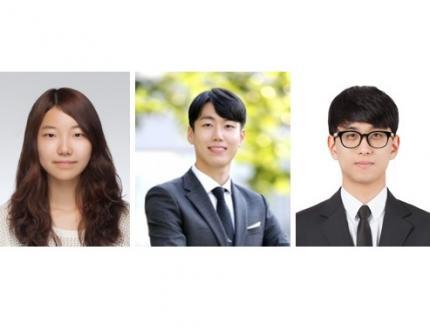 3 KAIST PhD Candidates Selected as the 2021 Google PhD Fellows
PhD candidates Soo Ye Kim and Sanghyun Woo from the KAIST School of Electrical Engineering and Hae Beom Lee from the Kim Jaechul Graduate School of AI were selected as the 2021 Google PhD Fellows. The Google PhD Fellowship is a scholarship program that supports graduate school students from around the world that have produced excellent achievements from promising computer science-related fields. The 75 selected fellows will receive ten thousand dollars of funding with the opportunity to discuss research and receive one-on-one feedback from experts in related fields at Google.
Kim and Woo were named fellows in the field of "Machine Perception, Speech Technology and Computer Vision" with research of deep learning based super-resolution and computer vision respectively. Lee was named a fellow in the field of "Machine Learning" for his research in meta-learning.
Kim's research includes the formulation of novel methods for super-resolution and HDR video restoration and deep joint frame interpolation and super-resolution methods. Many of her works have been presented in leading conferences in computer vision and AI such as CVPR, ICCV, and AAAI. In addition, she has been collaborating as a research intern with the Vision Group Team at Adobe Research to study depth map refinement techniques.
(Kim's research on deep learning based joint super-resolution and inverse tone-mapping framework for HDR videos)
Woo’s research includes an effective deep learning model design based on the attention mechanism and learning methods based on self-learning and simulators. His works have been also presented in leading conferences such as CVPR, ECCV, and NeurIPS. In particular, his work on the Convolutional Block Attention Module (CBAM) which was presented at ECCV in 2018 has surpassed over 2700 citations on Google Scholar after being referenced in many computer vision applications. He was also a recipient of Microsoft Research PhD Fellowship in 2020.
(Woo's research on attention mechanism based deep learning models)
Lee’s research focuses effectively overcoming various limitations of the existing meta-learning framework. Specifically, he proposed to deal with a realistic task distribution with imbalances, improved the practicality of meta-knowledge, and made meta-learning possible even in large-scale task scenarios. These various studies have been accepted to numerous top-tier machine learning conferences such as NeurIPS, ICML, and ICLR. In particular, one of his papers has been selected as an oral presentation at ICLR 2020 and another as a spotlight presentation at NeurIPS 2020.
(Lee's research on learning to balance and continual trajectory shifting)
Due to the COVID-19 pandemic, the award ceremony was held virtually at the Google PhD Fellowship Summit from August 31st to September 1st. The list of fellowship recipients is displayed on the Google webpage.
2021.10.18 View 6308
3 KAIST PhD Candidates Selected as the 2021 Google PhD Fellows
PhD candidates Soo Ye Kim and Sanghyun Woo from the KAIST School of Electrical Engineering and Hae Beom Lee from the Kim Jaechul Graduate School of AI were selected as the 2021 Google PhD Fellows. The Google PhD Fellowship is a scholarship program that supports graduate school students from around the world that have produced excellent achievements from promising computer science-related fields. The 75 selected fellows will receive ten thousand dollars of funding with the opportunity to discuss research and receive one-on-one feedback from experts in related fields at Google.
Kim and Woo were named fellows in the field of "Machine Perception, Speech Technology and Computer Vision" with research of deep learning based super-resolution and computer vision respectively. Lee was named a fellow in the field of "Machine Learning" for his research in meta-learning.
Kim's research includes the formulation of novel methods for super-resolution and HDR video restoration and deep joint frame interpolation and super-resolution methods. Many of her works have been presented in leading conferences in computer vision and AI such as CVPR, ICCV, and AAAI. In addition, she has been collaborating as a research intern with the Vision Group Team at Adobe Research to study depth map refinement techniques.
(Kim's research on deep learning based joint super-resolution and inverse tone-mapping framework for HDR videos)
Woo’s research includes an effective deep learning model design based on the attention mechanism and learning methods based on self-learning and simulators. His works have been also presented in leading conferences such as CVPR, ECCV, and NeurIPS. In particular, his work on the Convolutional Block Attention Module (CBAM) which was presented at ECCV in 2018 has surpassed over 2700 citations on Google Scholar after being referenced in many computer vision applications. He was also a recipient of Microsoft Research PhD Fellowship in 2020.
(Woo's research on attention mechanism based deep learning models)
Lee’s research focuses effectively overcoming various limitations of the existing meta-learning framework. Specifically, he proposed to deal with a realistic task distribution with imbalances, improved the practicality of meta-knowledge, and made meta-learning possible even in large-scale task scenarios. These various studies have been accepted to numerous top-tier machine learning conferences such as NeurIPS, ICML, and ICLR. In particular, one of his papers has been selected as an oral presentation at ICLR 2020 and another as a spotlight presentation at NeurIPS 2020.
(Lee's research on learning to balance and continual trajectory shifting)
Due to the COVID-19 pandemic, the award ceremony was held virtually at the Google PhD Fellowship Summit from August 31st to September 1st. The list of fellowship recipients is displayed on the Google webpage.
2021.10.18 View 6308 -
 Diva Sumi Jo to Join the KAIST Faculty
Visiting Distinguished Professor Jo will enrich KAIST’s scholarship and inspire futuristic art and technology research
Soprano Sumi Jo will join the KAIST faculty from the spring 2022 semester. Named as a visiting distinguished professor in the Graduate School of Culture Technology, she will give special leadership lectures. Her tenure will be through September 2024.
Jo joined the appointment ceremony held online at KAIST on October 14 from Portugal and expressed her high expectations for teaching KAIST students from next year. “I am very grateful for this opportunity to meet students at KAIST, the birthplace of advanced science and technology in Korea,” she said.
KAIST President Kwang Hyung Lee, who has stressed the importance of humanities and the arts in convergence studies of science and technology, lauded her joining the faculty as a big asset who will enrich KAIST’s scholarship. “Soprano Sumi Jo rose to stardom on the global music stage with her unrivaled talent and effort. I truly believe her experience and passion will inspire our students to expand their horizon of thought and knowledge,” said President Lee.
Distinguished Professor Jo will also participate in convergence research at the Graduate School of Culture Technology with KAIST professors and many other experts. The Sumi Jo Performing Arts Research Center at the Graduate School of Culture Technology will conduct research on the converging of imaging and audio processing technologies that will enhance virtual artists’ performances. Distinguished Professor Jo explained, “The world is changing so fast. I look forward to working on culture technology research at KAIST that will raise our life quality.”
Professor Juhan Nam from the Graduate School of Culture Technology said, “We look forward to working closely with her and her team to develop research themes that envision futuristic art combined with technology such as the metaverse and non-fungible tokens (NFTs).
Coloratura soprano Jo was born in Seoul and educated at Seoul National University and the Conservatorio Santa Cecilia in Italy. Among her teachers were Carolo Bergonzi and Giasnnelas Borelli. Following her graduation from the Conservatorio Santa Cecilia in 1985, she swept major international competitions in Seoul and Europe. In 1986, she was unanimously awarded the first prize in the Carlo Alberto Cappelli International Competition in Verona which is open only to the first-prize winners of major competitions.
Since her debut in the role of Gilda in Verdi’s Rigolleto in Italy in 1986, she has performed on the world's biggest stages along with noted maestros such as Herbert von Karajan, Georg Solti, Zubin Mehta, and James Levine. Distinguished Professor Jo, one of the most sought-after sopranos in the world, released more than 40 albums.
2021.10.15 View 6099
Diva Sumi Jo to Join the KAIST Faculty
Visiting Distinguished Professor Jo will enrich KAIST’s scholarship and inspire futuristic art and technology research
Soprano Sumi Jo will join the KAIST faculty from the spring 2022 semester. Named as a visiting distinguished professor in the Graduate School of Culture Technology, she will give special leadership lectures. Her tenure will be through September 2024.
Jo joined the appointment ceremony held online at KAIST on October 14 from Portugal and expressed her high expectations for teaching KAIST students from next year. “I am very grateful for this opportunity to meet students at KAIST, the birthplace of advanced science and technology in Korea,” she said.
KAIST President Kwang Hyung Lee, who has stressed the importance of humanities and the arts in convergence studies of science and technology, lauded her joining the faculty as a big asset who will enrich KAIST’s scholarship. “Soprano Sumi Jo rose to stardom on the global music stage with her unrivaled talent and effort. I truly believe her experience and passion will inspire our students to expand their horizon of thought and knowledge,” said President Lee.
Distinguished Professor Jo will also participate in convergence research at the Graduate School of Culture Technology with KAIST professors and many other experts. The Sumi Jo Performing Arts Research Center at the Graduate School of Culture Technology will conduct research on the converging of imaging and audio processing technologies that will enhance virtual artists’ performances. Distinguished Professor Jo explained, “The world is changing so fast. I look forward to working on culture technology research at KAIST that will raise our life quality.”
Professor Juhan Nam from the Graduate School of Culture Technology said, “We look forward to working closely with her and her team to develop research themes that envision futuristic art combined with technology such as the metaverse and non-fungible tokens (NFTs).
Coloratura soprano Jo was born in Seoul and educated at Seoul National University and the Conservatorio Santa Cecilia in Italy. Among her teachers were Carolo Bergonzi and Giasnnelas Borelli. Following her graduation from the Conservatorio Santa Cecilia in 1985, she swept major international competitions in Seoul and Europe. In 1986, she was unanimously awarded the first prize in the Carlo Alberto Cappelli International Competition in Verona which is open only to the first-prize winners of major competitions.
Since her debut in the role of Gilda in Verdi’s Rigolleto in Italy in 1986, she has performed on the world's biggest stages along with noted maestros such as Herbert von Karajan, Georg Solti, Zubin Mehta, and James Levine. Distinguished Professor Jo, one of the most sought-after sopranos in the world, released more than 40 albums.
2021.10.15 View 6099 -
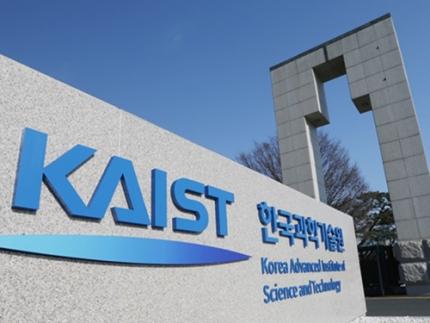 KAIST Entrepreneurial Partnership to Accelerate Startups and Venture Ecosystem
KAIST will launch the KAIST Entrepreneurial Partnership (KEP) program, which connects faculty members who own technology with those who want to launch startup.
The program encourages open innovation startups using strategies tailored to market-client demand requirements. This is also one of efforts to help realize ‘one startup per lab,’ initiated by President Kwang Hyung Lee’s new innovation strategy. KEP also aims to introduce the best technologies developing at KAIST to startups and to raise the success rate of technology commercialization.
The program will match KAIST faculty and student entrepreneur candidates with parties enrolled in the new Entrepreneur in Residence and Entrepreneurial Partner programs. Each team will be given a six-month test period with funding support.
KAIST will invite entrepreneurial experts from both technology and management fields to support the program participants. Around 30 experts with experience in developing new businesses, startups, and investments in large corporations or venture companies will be recruited as entrepreneurial partners. They will offer support for research and business development (R&BD), technology marketing, attracting venture investment from corporations, mergers and acquisitions, and business openings.
A survey showed that KAIST members who are interested in starting a business are experiencing difficulties finding an entrepreneurial expert (72.2%), with the complicated startup approval procedures (33.3%), and their lack of knowledge on entrepreneurship and funding (27.8%). The KEP program hopes to encourage KAIST faculty members and students who have well-developed business ideas and the appropriate technology but lack the capabilities to realize and develop them into a business.
Associate Vice President of Startups Young-Tae Kim said, “We will develop KEP into KAIST’s distinct entrepreneurial support system and produce exemplary outcomes of faculty and student startups. We will spread the startup DNA and lead the building of a virtuous cycle between entrepreneurship and the venture ecosystem.”
2021.10.14 View 6551
KAIST Entrepreneurial Partnership to Accelerate Startups and Venture Ecosystem
KAIST will launch the KAIST Entrepreneurial Partnership (KEP) program, which connects faculty members who own technology with those who want to launch startup.
The program encourages open innovation startups using strategies tailored to market-client demand requirements. This is also one of efforts to help realize ‘one startup per lab,’ initiated by President Kwang Hyung Lee’s new innovation strategy. KEP also aims to introduce the best technologies developing at KAIST to startups and to raise the success rate of technology commercialization.
The program will match KAIST faculty and student entrepreneur candidates with parties enrolled in the new Entrepreneur in Residence and Entrepreneurial Partner programs. Each team will be given a six-month test period with funding support.
KAIST will invite entrepreneurial experts from both technology and management fields to support the program participants. Around 30 experts with experience in developing new businesses, startups, and investments in large corporations or venture companies will be recruited as entrepreneurial partners. They will offer support for research and business development (R&BD), technology marketing, attracting venture investment from corporations, mergers and acquisitions, and business openings.
A survey showed that KAIST members who are interested in starting a business are experiencing difficulties finding an entrepreneurial expert (72.2%), with the complicated startup approval procedures (33.3%), and their lack of knowledge on entrepreneurship and funding (27.8%). The KEP program hopes to encourage KAIST faculty members and students who have well-developed business ideas and the appropriate technology but lack the capabilities to realize and develop them into a business.
Associate Vice President of Startups Young-Tae Kim said, “We will develop KEP into KAIST’s distinct entrepreneurial support system and produce exemplary outcomes of faculty and student startups. We will spread the startup DNA and lead the building of a virtuous cycle between entrepreneurship and the venture ecosystem.”
2021.10.14 View 6551 -
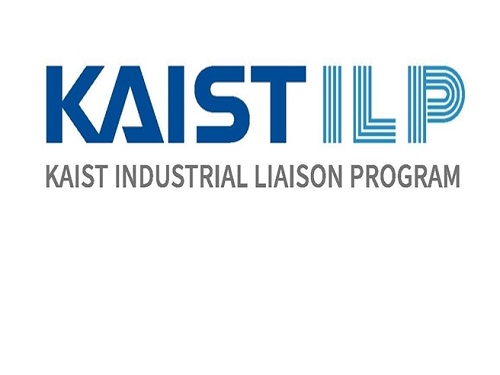 Industrial Liaison Program to Provide Comprehensive Consultation Services
The ILP’s one-stop solutions target all industrial sectors including conglomerates, small and medium-sized enterprises, venture companies, venture capital (VC) firms, and government-affiliated organizations.
The Industrial Liaison Center at KAIST launched the Industrial Liaison Program (ILP) on September 28, an industry-academic cooperation project to provide comprehensive solutions to industry partners. The Industrial Liaison Center will recruit member companies for this service every year, targeting all industrial sectors including conglomerates, small and medium-sized enterprises, venture companies, venture capital (VC) firms, and government-affiliated organizations.
The program plans to build a one-stop support system that can systematically share and use excellent resource information from KAIST’s research teams, R&D achievements, and infrastructure to provide member companies with much-needed services.
More than 40 KAIST professors with abundant academic-industrial collaboration experience will participate in the program. Experts from various fields with different points of view and experiences will jointly provide solutions to ILP member companies. To actively participate in academic-industrial liaisons and joint consultations, KAIST assigned 10 professors from related fields as program directors.
The program directors will come from four different fields including AI/robots (Professor Alice Oh, School from the School of Computing, Professor Young Jae Jang from the Department of Industrial & Systems Engineering, and Professor Yong-Hwa Park from Department of Mechanical Engineering), bio/medicine (Professor Daesoo Kim from Department of Biological Sciences and Professor YongKeun Park from Department of Physics), materials/electronics (Professor Sang Ouk Kim from the Department of Materials Science and Engineering and Professors Jun-Bo Yoon and Seonghwan Cho from the School of Electrical Engineering), and environment/energy (Professor Hee-Tak Kim from the Department of Biological Sciences and Professor Hoon Sohn from the Department of Civil and Environmental Engineering).
The transdisciplinary board of consulting professors that will lead technology innovation is composed of 30 professors including Professor Min-Soo Kim (School of Computing, AI), Professor Chan Hyuk Kim (Department of Biological Sciences, medicine), Professor Hae-Won Park (Department of Mechanical Engineering, robots), Professor Changho Suh (School of Electrical Engineering, electronics), Professor Haeshin Lee (Department of Chemistry, bio), Professor Il-Doo Kim (Department of Materials Science and Engineering, materials), Professor HyeJin Kim (School of Business Technology and Management), and Professor Byoung Pil Kim (School of Business Technology and Management, technology law)
The Head of the Industrial Liaison Center who is also in charge of the program, Professor Keon Jae Lee, said, “In a science and technology-oriented generation where technological supremacy determines national power, it is indispensable to build a new platform upon which innovative academic-industrial cooperation can be pushed forward in the fields of joint consultation, the development of academic-industrial projects, and the foundation of new industries.
He added, “KAIST professors carry out world-class research in many different fields and faculty members can come together through the ILP to communicate with representatives from industry to improve their corporations’ global competitiveness and further contribute to our nation’s interests by cultivating strong small enterprises
2021.09.30 View 7189
Industrial Liaison Program to Provide Comprehensive Consultation Services
The ILP’s one-stop solutions target all industrial sectors including conglomerates, small and medium-sized enterprises, venture companies, venture capital (VC) firms, and government-affiliated organizations.
The Industrial Liaison Center at KAIST launched the Industrial Liaison Program (ILP) on September 28, an industry-academic cooperation project to provide comprehensive solutions to industry partners. The Industrial Liaison Center will recruit member companies for this service every year, targeting all industrial sectors including conglomerates, small and medium-sized enterprises, venture companies, venture capital (VC) firms, and government-affiliated organizations.
The program plans to build a one-stop support system that can systematically share and use excellent resource information from KAIST’s research teams, R&D achievements, and infrastructure to provide member companies with much-needed services.
More than 40 KAIST professors with abundant academic-industrial collaboration experience will participate in the program. Experts from various fields with different points of view and experiences will jointly provide solutions to ILP member companies. To actively participate in academic-industrial liaisons and joint consultations, KAIST assigned 10 professors from related fields as program directors.
The program directors will come from four different fields including AI/robots (Professor Alice Oh, School from the School of Computing, Professor Young Jae Jang from the Department of Industrial & Systems Engineering, and Professor Yong-Hwa Park from Department of Mechanical Engineering), bio/medicine (Professor Daesoo Kim from Department of Biological Sciences and Professor YongKeun Park from Department of Physics), materials/electronics (Professor Sang Ouk Kim from the Department of Materials Science and Engineering and Professors Jun-Bo Yoon and Seonghwan Cho from the School of Electrical Engineering), and environment/energy (Professor Hee-Tak Kim from the Department of Biological Sciences and Professor Hoon Sohn from the Department of Civil and Environmental Engineering).
The transdisciplinary board of consulting professors that will lead technology innovation is composed of 30 professors including Professor Min-Soo Kim (School of Computing, AI), Professor Chan Hyuk Kim (Department of Biological Sciences, medicine), Professor Hae-Won Park (Department of Mechanical Engineering, robots), Professor Changho Suh (School of Electrical Engineering, electronics), Professor Haeshin Lee (Department of Chemistry, bio), Professor Il-Doo Kim (Department of Materials Science and Engineering, materials), Professor HyeJin Kim (School of Business Technology and Management), and Professor Byoung Pil Kim (School of Business Technology and Management, technology law)
The Head of the Industrial Liaison Center who is also in charge of the program, Professor Keon Jae Lee, said, “In a science and technology-oriented generation where technological supremacy determines national power, it is indispensable to build a new platform upon which innovative academic-industrial cooperation can be pushed forward in the fields of joint consultation, the development of academic-industrial projects, and the foundation of new industries.
He added, “KAIST professors carry out world-class research in many different fields and faculty members can come together through the ILP to communicate with representatives from industry to improve their corporations’ global competitiveness and further contribute to our nation’s interests by cultivating strong small enterprises
2021.09.30 View 7189 -
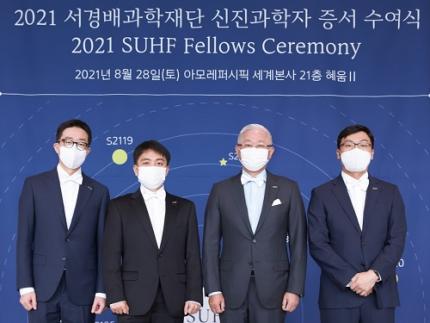 Two Researchers Designated as SUHF Fellows
Professor Taeyun Ku from the Graduate School of Medical Science and Engineering and Professor Hanseul Yang from the Department of Biological Sciences were nominated as 2021 fellows of the Suh Kyungbae Foundation (SUHF).
SUHF selected three young promising scientists from 53 researchers who are less than five years into their careers. A panel of judges comprised of scholars from home and abroad made the final selection based on the candidates’ innovativeness and power to influence. Professor You-Bong Hyun from Seoul National University also won the fellowship.
Professor Ku’s main topic is opto-connectomics. He will study ways to visualize the complex brain network using innovative technology that transforms neurons into optical elements.
Professor Yang will research the possibility of helping patients recover from skin diseases or injuries without scars by studying spiny mouse genes.
SUHF was established by Amorepacific Group Chairman Suh Kyungbae in 2016 with 300 billion KRW of his private funds. Under the vision of ‘contributing to humanity by supporting innovative discoveries of bioscience researchers,’ the foundation supports promising Korean scientists who pioneer new fields of research in biological sciences.
From 2017 to this year, SUHF has selected 20 promising scientists in the field of biological sciences. Selected scientists are provided with up to KRW 500 million each year for five years. The foundation has provided a total of KRW 48.5 billion in research funds to date.
2021.09.15 View 8763
Two Researchers Designated as SUHF Fellows
Professor Taeyun Ku from the Graduate School of Medical Science and Engineering and Professor Hanseul Yang from the Department of Biological Sciences were nominated as 2021 fellows of the Suh Kyungbae Foundation (SUHF).
SUHF selected three young promising scientists from 53 researchers who are less than five years into their careers. A panel of judges comprised of scholars from home and abroad made the final selection based on the candidates’ innovativeness and power to influence. Professor You-Bong Hyun from Seoul National University also won the fellowship.
Professor Ku’s main topic is opto-connectomics. He will study ways to visualize the complex brain network using innovative technology that transforms neurons into optical elements.
Professor Yang will research the possibility of helping patients recover from skin diseases or injuries without scars by studying spiny mouse genes.
SUHF was established by Amorepacific Group Chairman Suh Kyungbae in 2016 with 300 billion KRW of his private funds. Under the vision of ‘contributing to humanity by supporting innovative discoveries of bioscience researchers,’ the foundation supports promising Korean scientists who pioneer new fields of research in biological sciences.
From 2017 to this year, SUHF has selected 20 promising scientists in the field of biological sciences. Selected scientists are provided with up to KRW 500 million each year for five years. The foundation has provided a total of KRW 48.5 billion in research funds to date.
2021.09.15 View 8763 -
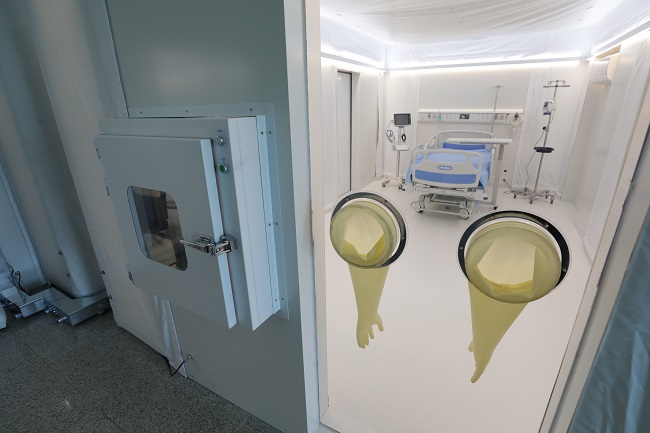 MCM Utilized at Residential Treatment Center in Gyeonggi
The Mobile Clinic Module (MCM) developed by the KAIST Action for Respiratory Epidemics was installed at special residential treatment center in Gyeonggi Province on September 13.
The MCM is an isolate negative pressure unit fitted with high-quality medical equipment, developed by Professor Taek-Jin Nam of the Department of Industrial Design under the KAIST New Deal R&D Initiative. This is also a part of the Korean Disease Control Package Development Project from last July.
In January, a ward with four beds for critical care was installed at the Korea Institute for Radiological & Medical Sciences in Seoul for a trial operation, and two mild cases were treated there. It was also implemented as an isolated negative pressure unit in the Daejeon Konyang University Hospital emergency room in June, and has treated 138 cases since.
The special residential treatment center installed in the Gyeonggi Provincial Academy gymnasium, which consists of 28 beds in 14 rooms (double occupancy) and a multipurpose room (for X-rays and treatment), is to remain open through October 10. Unlike existing treatment centers that have quarantined COVID-19 patients for two weeks, the Gyeonggi MCM will act as a self-treatment-associated short-term treatment center. While in self-treatment, patients showing symptoms requiring special attention will be moved to the MCM, followed by short-term hospitalization of 1-3 days for observation before further measures are taken.
Patients can be treated using the MCM’s own treatment capacities, including in-person and oxygen treatment, X-rays, and IVs. There are individual bathrooms in each room, and the pressure, ventilation, and the automatic opening and closing of the entrance can be centrally monitored and controlled. Patients showing symptoms during treatment will be moved to a specially designated hospital for critical care, and will return to the self-treatment center if no further abnormalities are reported.
The Gyeonggi Provincial Medical Center’s Ansung Hospital will take charge of operating the special treatment center. Each day, one or two doctors, three nurses, two nursing assistants, one administrative staff member, two or three disinfection specialists, and a medical imaging engineer will work in three shifts. There will also be about 20 additional specially designated staff members including KAIST researchers, firefighters, and police officers.
The MCM was internationally recognized as an excellent medical facility not only for its functionality, economic feasibility, and utility, but also for its unique design and aesthetics. It received two Best of Best awards at the Red Dot Award in product design and Communication Design in user interface.
By running this special treatment center, KAIST will conduct research on how to build an optimized model for efficient negative pressure medical units. This research is expected to lead to advances in waste water treatment systems, mobile bathrooms optimized for infectious cases, and MCM user interfaces for electronic devices, etc.
Professor Taek-Jin Nam, the general director of the project and design, said “if there is a gymnasium available, we can convert it into a special treatment center fitted with a waste water treatment system, and pressure equipment in two weeks even without additional infrastructure.”
The head of the KAIST New Deal R&D Initiative Choongsik Bae said, “our MCM research started in July of last year, and in just over a year, it has become a successful and innovative case that has undergone trials and become commercialized in a short period of time.” He added, “In response to COVID-19, KAIST is conducting research and empirical studies, not just in relation to the MCM, but in other areas of disease control as well.”
Based on the excellent disease control technologies developed by KAIST research teams, the KAIST Action for Respiratory Epidemics is conducting technology transfers and industrialization, and is developing a Korean disease control package model
2021.09.15 View 11740
MCM Utilized at Residential Treatment Center in Gyeonggi
The Mobile Clinic Module (MCM) developed by the KAIST Action for Respiratory Epidemics was installed at special residential treatment center in Gyeonggi Province on September 13.
The MCM is an isolate negative pressure unit fitted with high-quality medical equipment, developed by Professor Taek-Jin Nam of the Department of Industrial Design under the KAIST New Deal R&D Initiative. This is also a part of the Korean Disease Control Package Development Project from last July.
In January, a ward with four beds for critical care was installed at the Korea Institute for Radiological & Medical Sciences in Seoul for a trial operation, and two mild cases were treated there. It was also implemented as an isolated negative pressure unit in the Daejeon Konyang University Hospital emergency room in June, and has treated 138 cases since.
The special residential treatment center installed in the Gyeonggi Provincial Academy gymnasium, which consists of 28 beds in 14 rooms (double occupancy) and a multipurpose room (for X-rays and treatment), is to remain open through October 10. Unlike existing treatment centers that have quarantined COVID-19 patients for two weeks, the Gyeonggi MCM will act as a self-treatment-associated short-term treatment center. While in self-treatment, patients showing symptoms requiring special attention will be moved to the MCM, followed by short-term hospitalization of 1-3 days for observation before further measures are taken.
Patients can be treated using the MCM’s own treatment capacities, including in-person and oxygen treatment, X-rays, and IVs. There are individual bathrooms in each room, and the pressure, ventilation, and the automatic opening and closing of the entrance can be centrally monitored and controlled. Patients showing symptoms during treatment will be moved to a specially designated hospital for critical care, and will return to the self-treatment center if no further abnormalities are reported.
The Gyeonggi Provincial Medical Center’s Ansung Hospital will take charge of operating the special treatment center. Each day, one or two doctors, three nurses, two nursing assistants, one administrative staff member, two or three disinfection specialists, and a medical imaging engineer will work in three shifts. There will also be about 20 additional specially designated staff members including KAIST researchers, firefighters, and police officers.
The MCM was internationally recognized as an excellent medical facility not only for its functionality, economic feasibility, and utility, but also for its unique design and aesthetics. It received two Best of Best awards at the Red Dot Award in product design and Communication Design in user interface.
By running this special treatment center, KAIST will conduct research on how to build an optimized model for efficient negative pressure medical units. This research is expected to lead to advances in waste water treatment systems, mobile bathrooms optimized for infectious cases, and MCM user interfaces for electronic devices, etc.
Professor Taek-Jin Nam, the general director of the project and design, said “if there is a gymnasium available, we can convert it into a special treatment center fitted with a waste water treatment system, and pressure equipment in two weeks even without additional infrastructure.”
The head of the KAIST New Deal R&D Initiative Choongsik Bae said, “our MCM research started in July of last year, and in just over a year, it has become a successful and innovative case that has undergone trials and become commercialized in a short period of time.” He added, “In response to COVID-19, KAIST is conducting research and empirical studies, not just in relation to the MCM, but in other areas of disease control as well.”
Based on the excellent disease control technologies developed by KAIST research teams, the KAIST Action for Respiratory Epidemics is conducting technology transfers and industrialization, and is developing a Korean disease control package model
2021.09.15 View 11740 -
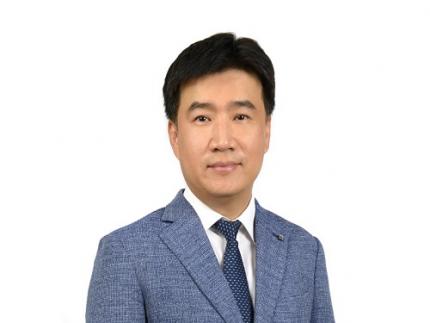 Professor Il-Doo Kim Receives the Science Minister’s Award
Professor Il-Doo Kim from the Department of Materials Science and Engineering received the Science and ICT Minister’s Award in recognition of his commercialization and technology transfer achievements during the Day of IP celebration.
Professor Kim, who has made over 222 patents application and registration home and abroad, has advanced toxic gas detection and breath gas sensor technology by arraying nanosensor fibers. His technological advances in micro-electro-mechanical systems (MEMS) helped to advance the commercialization of the MEMS-related sensor and improve its overall competitiveness.
He founded the Il-Doo Kim Research Center in 2019 and focuses on the commercialization of nanofiber manufacturing through electrospinning and highly efficient nanofiber filters. For instance, he succeeded in manufacturing a nano-filter recyclable mask that maintains excellent filtering efficiency even after hand washing through the development of proprietary technology that aligns nanofibers with a diameter of 100~500 nanometers in orthogonal or unidirectional directions.
Professor Kim also serves as an associate editor at ACS Nano. He said, “The importance of IP goes without saying. I look forward to the registration and application of more KAIST patents leading to commercialization, paving the way for national technological competitiveness.”
2021.09.15 View 7325
Professor Il-Doo Kim Receives the Science Minister’s Award
Professor Il-Doo Kim from the Department of Materials Science and Engineering received the Science and ICT Minister’s Award in recognition of his commercialization and technology transfer achievements during the Day of IP celebration.
Professor Kim, who has made over 222 patents application and registration home and abroad, has advanced toxic gas detection and breath gas sensor technology by arraying nanosensor fibers. His technological advances in micro-electro-mechanical systems (MEMS) helped to advance the commercialization of the MEMS-related sensor and improve its overall competitiveness.
He founded the Il-Doo Kim Research Center in 2019 and focuses on the commercialization of nanofiber manufacturing through electrospinning and highly efficient nanofiber filters. For instance, he succeeded in manufacturing a nano-filter recyclable mask that maintains excellent filtering efficiency even after hand washing through the development of proprietary technology that aligns nanofibers with a diameter of 100~500 nanometers in orthogonal or unidirectional directions.
Professor Kim also serves as an associate editor at ACS Nano. He said, “The importance of IP goes without saying. I look forward to the registration and application of more KAIST patents leading to commercialization, paving the way for national technological competitiveness.”
2021.09.15 View 7325 -
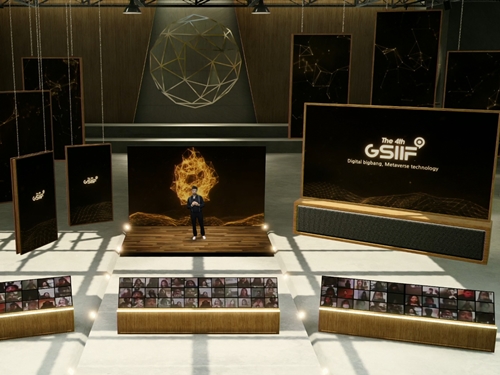 Digital Big Bang, Metaverse Technologies
The GSI Forum 2021 will explore the potential of new metaverse technologies that will change our daily lives
KAIST will be hosting a live online international forum on Sept.8 at 9 am (KST) through its KAIST YouTube channel. The forum will explore global trends regarding metaverse technology innovations and applications and discuss how we can build a new technology ecosystem.
Titled `Digital Big Bang, Metaverse Technology,' the Global Strategy Institute-International Forum 2021 will be the fourth event of its kind, following the three international forums held in 2020. The forum will delve into the development trends of metaverse platforms and AR/VR technologies and gather experts to discuss how such technologies could transform multiple aspects of our future, including education.
President Kwang Hyung Lee explains in his opening remarks that new technologies are truly opening a new horizon for our lives, saying, “In the education sector, digital technology will also create new opportunities to resolve the longstanding pedagogical shortfalls of one-way knowledge delivery systems. New digital technologies will help to unlock the creativity of our students. Education tailored to the students’ individual levels will not only help them accumulate knowledge but improve their ability to use it. Universities around the world are now at the same starting line. We should carve out our own distinct metaverse that is viable for human interactions and diverse technological experiences that promote students’ creativity and collaborative minds.”
Minster of Science and ICT Hyesook Lim will introduce how the Korean government is working to develop metaverse industries as a new potential engine of growth for the future in her welcoming remarks. The government’s efforts include collaborations with the private sector, investments in R&D, the development of talent, and regulatory reforms. Minister Lim will also emphasize the importance of national-level discussions regarding the establishment of a metaverse ecosystem and long-term value creation.
The organizers have invited global experts to share their knowledge and insights.
Kidong Bae, who is in charge of the KT Enterprise Project and ‘Metaverse One Team’ will talk about the current trends in the metaverse market and their implications, as well as KT’s XR technology references. He will also introduce strategies to establish and utilize a metaverse ecosystem, and highlight their new technologies as a global leader in 5G networks.
Jinha Lee, co-founder and CPO of the American AR solution company Spatial, will showcase a remote collaboration office that utilizes AR technology as a potential solution for collaborative activities in the post-COVID-19 era, where remote working is the ‘new normal.’ Furthermore, Lee will discuss how future workplaces that are not limited by space or distance will affect our values and creativity.
Professor Frank Steinicke from the University of Hamburg will present the ideal form of next-generation immersive technology that combines intelligent virtual agents, mixed reality, and IoT, and discuss his predictions for how the future of metaverse technology will be affected.
Marco Tempest, a creative technologist at NASA and a Director’s Fellow at the MIT Media Lab, will also be joining the forum as a plenary speaker. Tempest will discuss the potential of immersive technology in media, marketing, and entertainment, and will propose a future direction for immersive technology to enable the sharing of experiences, emotions, and knowledge.
Other speakers include Beomjoo Kim from Unity Technologies Korea, Professor Woontaek Woo from the Graduate School of Culture Technology at KAIST, Vice President of Global Sales at Labster Joseph Ferraro, and CEO of 3DBear Jussi Kajala. They will make presentations on metaverse technology applications for future education.
The keynote session will also have an online panel consisting of 50 domestic and overseas metaverse specialists, scientists, and teachers. The forum will hold a Q&A and discussion session where the panel members can ask questions to the keynote speakers regarding the prospects of metaverse and immersive technologies for education.
GSI Director Hoon Sohn stated, "KAIST will seize new opportunities that will arise in a future centered around metaverse technology and will be at the forefront to take advantage of the growing demand for innovative science and technology in non-contact societies. KAIST will also play a pivotal role in facilitating global cooperation, which will be vital to establish a metaverse ecosystem.”
2021.09.07 View 9425
Digital Big Bang, Metaverse Technologies
The GSI Forum 2021 will explore the potential of new metaverse technologies that will change our daily lives
KAIST will be hosting a live online international forum on Sept.8 at 9 am (KST) through its KAIST YouTube channel. The forum will explore global trends regarding metaverse technology innovations and applications and discuss how we can build a new technology ecosystem.
Titled `Digital Big Bang, Metaverse Technology,' the Global Strategy Institute-International Forum 2021 will be the fourth event of its kind, following the three international forums held in 2020. The forum will delve into the development trends of metaverse platforms and AR/VR technologies and gather experts to discuss how such technologies could transform multiple aspects of our future, including education.
President Kwang Hyung Lee explains in his opening remarks that new technologies are truly opening a new horizon for our lives, saying, “In the education sector, digital technology will also create new opportunities to resolve the longstanding pedagogical shortfalls of one-way knowledge delivery systems. New digital technologies will help to unlock the creativity of our students. Education tailored to the students’ individual levels will not only help them accumulate knowledge but improve their ability to use it. Universities around the world are now at the same starting line. We should carve out our own distinct metaverse that is viable for human interactions and diverse technological experiences that promote students’ creativity and collaborative minds.”
Minster of Science and ICT Hyesook Lim will introduce how the Korean government is working to develop metaverse industries as a new potential engine of growth for the future in her welcoming remarks. The government’s efforts include collaborations with the private sector, investments in R&D, the development of talent, and regulatory reforms. Minister Lim will also emphasize the importance of national-level discussions regarding the establishment of a metaverse ecosystem and long-term value creation.
The organizers have invited global experts to share their knowledge and insights.
Kidong Bae, who is in charge of the KT Enterprise Project and ‘Metaverse One Team’ will talk about the current trends in the metaverse market and their implications, as well as KT’s XR technology references. He will also introduce strategies to establish and utilize a metaverse ecosystem, and highlight their new technologies as a global leader in 5G networks.
Jinha Lee, co-founder and CPO of the American AR solution company Spatial, will showcase a remote collaboration office that utilizes AR technology as a potential solution for collaborative activities in the post-COVID-19 era, where remote working is the ‘new normal.’ Furthermore, Lee will discuss how future workplaces that are not limited by space or distance will affect our values and creativity.
Professor Frank Steinicke from the University of Hamburg will present the ideal form of next-generation immersive technology that combines intelligent virtual agents, mixed reality, and IoT, and discuss his predictions for how the future of metaverse technology will be affected.
Marco Tempest, a creative technologist at NASA and a Director’s Fellow at the MIT Media Lab, will also be joining the forum as a plenary speaker. Tempest will discuss the potential of immersive technology in media, marketing, and entertainment, and will propose a future direction for immersive technology to enable the sharing of experiences, emotions, and knowledge.
Other speakers include Beomjoo Kim from Unity Technologies Korea, Professor Woontaek Woo from the Graduate School of Culture Technology at KAIST, Vice President of Global Sales at Labster Joseph Ferraro, and CEO of 3DBear Jussi Kajala. They will make presentations on metaverse technology applications for future education.
The keynote session will also have an online panel consisting of 50 domestic and overseas metaverse specialists, scientists, and teachers. The forum will hold a Q&A and discussion session where the panel members can ask questions to the keynote speakers regarding the prospects of metaverse and immersive technologies for education.
GSI Director Hoon Sohn stated, "KAIST will seize new opportunities that will arise in a future centered around metaverse technology and will be at the forefront to take advantage of the growing demand for innovative science and technology in non-contact societies. KAIST will also play a pivotal role in facilitating global cooperation, which will be vital to establish a metaverse ecosystem.”
2021.09.07 View 9425